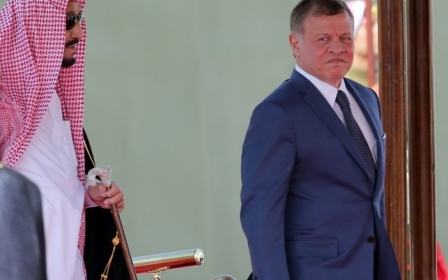Jordan protests continue despite price rise freeze

Attempts to appease protesters in Jordan appeared to have failed as protests continued across the country through Friday night and into Saturday.
Hundreds protested in the capital Amman on Saturday and more took to the streets in other Jordanian cities, despite King Abdullah II ordering a freeze on controversial fuel and electricity price increases.
Some demonstrators blocked roads with their cars on Friday night, while others held signs reading: "The people of Jordan will not kneel."
Late on Friday, hundreds of protesters gathered outside the prime minister's office calling for the fall of the government.
The rare protests have been growing since Wednesday, when thousands joined a general strike called by trade unions to oppose a proposed income tax law that would see a greater number of Jordanians taxed and businesses also paying more.
The anger was compounded on Thursday when the government announced an increase in fuel and electricity prices.
King Abdullah attempted to allay fears on Friday by freezing the price rises, while Jordanian lawmakers announced that the majority of them planned to vote against the new tax law.
The law is the latest in a series of economic reforms since Amman secured a $723m, three-year credit line from the International Monetary Fund in 2016.
The loan, intended to support economic and financial reforms, has the long-term objective of reducing Jordan's public debt from about 94 percent of GDP to 77 percent by 2021.
Past price hikes have triggered riots in Jordan, a country of 9.5 million with few resources, burdened by poverty and unemployment.
Mohammad Ayesh, a journalist and political analyst, told Middle East Eye: "The real problem is the Saudi aid that has stopped in recent years, and Jordan depends on foreign aid as the main source for the economy."
Syrian refugees living in Jordan have also been a burden on the government's finances, he said. There are just over 655,000 registered Syrian refugees in the country.
"These protests could be planned messages from Jordan to outside countries, especially Saudi Arabia and the UAE," Ayesh said. "The main message would be: we have an internal crisis and we need direct aid to save the stability of the country."
Some analysts believe Jordan's stance over Jerusalem has been a source of tension with Saudi Arabia, which has increasingly towed Washington’s line.
US President Donald Trump's decision in December to recognise Jerusalem as the capital of Israel drew street protests in Jordan. Soon after, sources told MEE, Saudi Arabia summoned King Abdullah to Riyadh and told him not to attend an Organisation of Islamic Cooperation meeting in which Jerusalem would be discussed.
Abdullah attended anyway and made his position public: "I repeat: Jerusalem is our red line ... We will never give up on our demand for a sovereign and independent Palestine. We cannot be spectators in this situation because it impacts all our futures."
In February, while speaking to university students in Amman, the king drew a direct connection between the kingdom's stance on Jerusalem and its economic woes.
"The economic situation and the pressure on us is because of our political stances," he said. "There were messages [saying], 'Go along with us regarding Jerusalem and we will ease it on you.'"
Stay informed with MEE's newsletters
Sign up to get the latest alerts, insights and analysis, starting with Turkey Unpacked
Middle East Eye delivers independent and unrivalled coverage and analysis of the Middle East, North Africa and beyond. To learn more about republishing this content and the associated fees, please fill out this form. More about MEE can be found here.




